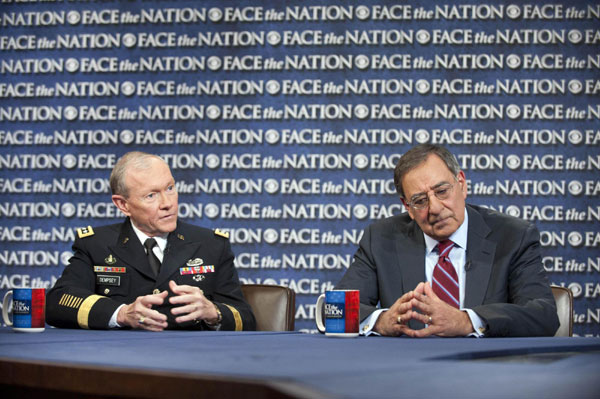US to have the strongest military despite cuts
Updated: 2012-01-09 17:01
(Agencies)
|
||||||||
WASHINGTON - Defense Secretary Leon Panetta cautioned global rivals on Sunday not to misjudge US plans to slash military spending over the next decade, saying America would still field the world's strongest military and nobody should "mess with that."
|
 |
|
General Martin Dempsey (L), the top US military officer as chairman of the Joint Chiefs of Staff, and Defense Secretary Leon Panetta (R) answer a question during CBS's "Face the Nation" program in Washington Jan 6, 2012. [Photo/Agencies] |
Panetta, speaking on CBS's "Face the Nation," also reiterated the tough US stance toward Iran's threat to close the Strait of Hormuz, which is vital for oil shipping in the Gulf, saying the United States would not "tolerate" it.
"That's another red line for us and ... we will respond to them," he said.
General Martin Dempsey, chairman of the Joint Chiefs of Staff, told "Face the Nation" Iran had been investing in the weapons they would need to close the strait but the United States had been working to "ensure if that happens, we can defeat that".
"The simple answer is, 'Yes, they can block it,'" he said. "But we would take action and reopen the strait."
Asked whether it would be difficult to take out Iran's nuclear capability, Dempsey said it was his job to plan and understand the risks associated with any military option and "all those activities are going on".
Pressed on whether the United States could take out Iran's nuclear sites without using nuclear weapons, Dempsey would only say: "I absolutely want them to believe that that's the case."
"They need to know that ... if they take that step, they are going to get stopped," Panetta added.
The United States is concerned that Iran's nuclear program is aimed at producing a weapon, but Tehran insists it is for peaceful energy production.
The tough talk comes days after President Barack Obama unveiled a new military strategy that calls for a smaller force as the United States cuts $487 billion in projected defense spending over the next decade in an effort to deal with the nation's $14 trillion debt.
The new strategy, which is meant to identify spending priorities as the military cuts back, calls for greater emphasis on Asia even as the Army and Marines shrink to become smaller and more agile forces.

 Relief reaches isolated village
Relief reaches isolated village
 Rainfall poses new threats to quake-hit region
Rainfall poses new threats to quake-hit region
 Funerals begin for Boston bombing victims
Funerals begin for Boston bombing victims
 Quake takeaway from China's Air Force
Quake takeaway from China's Air Force
 Obama celebrates young inventors at science fair
Obama celebrates young inventors at science fair
 Earth Day marked around the world
Earth Day marked around the world
 Volunteer team helping students find sense of normalcy
Volunteer team helping students find sense of normalcy
 Ethnic groups quick to join rescue efforts
Ethnic groups quick to join rescue efforts
Most Viewed
Editor's Picks

|

|

|

|

|

|
Today's Top News
Health new priority for quake zone
Xi meets US top military officer
Japan's boats driven out of Diaoyu
China mulls online shopping legislation
Bird flu death toll rises to 22
Putin appoints new ambassador to China
Japanese ships blocked from Diaoyu Islands
Inspired by Guan, more Chinese pick up golf
US Weekly

|

|







